- Social Factors Help Explain Worse Cardiovascular Health among Adults in Rural Vs. Urban Communities
- Reducing Barriers to Participation in Population-Based Total Cost of Care (PB-TCOC) Models and Supporting Primary and Specialty Care Transformation: Request for Input
- Secretary Kennedy Renews Public Health Emergency Declaration to Address National Opioid Crisis
- 2025 Marketplace Integrity and Affordability Proposed Rule
- Rural America Faces Growing Shortage of Eye Surgeons
- NRHA Continues Partnership to Advance Rural Oral Health
- Comments Requested on Mobile Crisis Team Services: An Implementation Toolkit Draft
- Q&A: What Are the Challenges and Opportunities of Small-Town Philanthropy?
- HRSA Administrator Carole Johnson, Joined by Co-Chair of the Congressional Black Maternal Health Caucus Congresswoman Lauren Underwood, Announces New Funding, Policy Action, and Report to Mark Landmark Year of HRSA's Enhancing Maternal Health Initiative
- Biden-Harris Administration Announces $60 Million Investment for Adding Early Morning, Night, and Weekend Hours at Community Health Centers
- Volunteer Opportunity for HUD's Office of Housing Counseling Tribe and TDHE Certification Exam
- Who Needs Dry January More: Rural or Urban Drinkers?
- Rural Families Have 'Critical' Need for More Hospice, Respite Care
- Rural Telehealth Sees More Policy Wins, but Only Short-Term
- States Help Child Care Centers Expand in Bid To Create More Slots, Lower Prices
HHS Climate Pledge Reopens
 The initiative, launched by the U.S. Department of Health & Human Services last April, asks hospitals, health systems, and other industry stakeholders to make efforts to reduce greenhouse gas emissions and increase their communities’ climate resilience. The pledge is one part of a larger HHS effort to consider the impact that climate change has on the entire country and take steps toward sustainability. A recent article in The Appalachian Voice describes the impact of climate change in rural mountain communities. Watch a video that explains what the healthcare sector can do and sign the pledge by Wednesday, April 12 to be recognized in an Earth Day announcement.
The initiative, launched by the U.S. Department of Health & Human Services last April, asks hospitals, health systems, and other industry stakeholders to make efforts to reduce greenhouse gas emissions and increase their communities’ climate resilience. The pledge is one part of a larger HHS effort to consider the impact that climate change has on the entire country and take steps toward sustainability. A recent article in The Appalachian Voice describes the impact of climate change in rural mountain communities. Watch a video that explains what the healthcare sector can do and sign the pledge by Wednesday, April 12 to be recognized in an Earth Day announcement.
Read About the Changes HRSA has Made to the Budget
 The U.S. Department of Health & Human Service’s budget request for FY 2024, Building a Healthy America, was released on March 9, 2023, and HRSA’s FY 2024 Congressional Budget Justification was released on March 13, 2023. The total request for the Federal Office of Rural Health Policy (FORHP) was a budget of $416 million, an increase of $63 million from the FY 2023 enacted budget. This budget request would enable FORHP to continue funding to our technical assistance partners, expand our reach to additional rural communities, and develop three new programs.
The U.S. Department of Health & Human Service’s budget request for FY 2024, Building a Healthy America, was released on March 9, 2023, and HRSA’s FY 2024 Congressional Budget Justification was released on March 13, 2023. The total request for the Federal Office of Rural Health Policy (FORHP) was a budget of $416 million, an increase of $63 million from the FY 2023 enacted budget. This budget request would enable FORHP to continue funding to our technical assistance partners, expand our reach to additional rural communities, and develop three new programs.
Notable increases would include:
- Rural Outreach Grants – $2 million increase
- Rural Communities Opioids Response Program – $20 million increase
The budget proposes three new programs targeting the unique and emerging needs of rural communities.
- Rural Health Clinic Behavioral Health Initiative: Rural areas represent nearly 60 percent of Mental Health Professional Shortage Areas, encompassing more than 25 million people who do not have adequate access to mental healthcare providers. $10 million would support an initiative to expand access to mental health services in rural communities where Rural Health Clinics serve as a key access point.
With 143 hospital closures since 2010, including 19 closures in 2020, the FY 2024 budget requests an investment of $30 million towards helping rural communities sustain their hospital (including Critical Access Hospitals and Rural Emergency Hospitals) healthcare infrastructure.
- Financial and Community Sustainability for At-Risk Rural Hospitals Program: $10 million would support rural hospitals at-risk for imminent closure through targeted technical assistance, and
- Rural Hospital Stabilization Pilot Program, $20 million would go toward new pilot program supporting to at-risk rural hospitals to enhance and or expand needed service lines.
The request also proposes significant investments in the health workforce. HRSA’s Bureau of Health Workforce would see an overall increase of $892 million from the FY 2023 budget, of which National Health Service Corps would receive a $548 million increase to ensure even more providers are incentivized to practice in underserved and rural communities. Additionally, $125 million would be added to the Ending the HIV Epidemic in the United States Initiative, specifically to increase evidence-based practices and support HIV care for clients including those in the seven states with substantial rural HIV burden.
SAMHSA Seeks Comments on Opioid Use Disorder Proposed Rule
The Substance Abuse and Services Administration (SAMHSA) released a proposed rule seeking to modernize regulations regarding medications for the treatment of opioid use disorder (MOUD) and to make MOUD more accessible to all patients, especially rural patients that often have to travel further to receive treatment. For more information, review these SAMHSA FAQs. Comments are due by Feb. 14, 2023.
Appalachian Regional Commission Announces SUD Recovery Ecosystem Grant Funding

On January 17, 2023 the Appalachian Regional Commission (ARC), a federal-state partnership working to strengthen economic growth and community development in 13 Appalachian states, issued a Request for Proposals (RFP) for its Investments Supporting Partnerships in Recovery Ecosystems (INSPIRE) initiative. The grant program addresses the region’s substance use disorder (SUD) crisis with investments up to $13 million in the creation and expansion of a SUD recovery ecosystem that helps facilitate workforce entry and re-entry.
Awards issued through the INSPIRE Initiative will support a wide variety of projects on the post-treatment to employment continuum, including investments in healthcare networks to better meet the needs of SUD recovery professionals, recovery-focused job and workforce training programs, expanded recovery support networks, training and certification of recovery specialists, and more. Successful INSPIRE grant applications will demonstrate the potential for individuals in recovery to obtain and maintain stable employment, with a focus on contributing to and expanding a strong recovery ecosystem of support services and training opportunities that lead to successful entry and re-entry into the workforce. Proposals may also include expanded community- and partnership-based approaches to establish stronger coordination among recovery and training services, as well as strategies to integrate plans with existing state and regional economic development activities. Letters of Intent (LOI) for implementation grants up to $500,000 and planning grants up to $50,000 under INSPIRE are due February 21, 2023. The deadline for final applications is March 17, 2023. Award announcements are anticipated to be made in September 2023.
For more information on this initiative and how to apply, please visit: https://www.arc.gov/inspire-initiative-application-information/
Throughout the month of February, ARC will be hosting several events focusing on the INSPIRE Initiative for communities to learn more about the program. Mark your calendars now to join us on the following dates:
- February 15 at 10:00 a.m. EST (Virtual Pre-Application Workshop)
- February 23 (In-Person Pre-Application Workshop)*
- February 28 (In-Person Pre-Application Workshop)*
- March 2 at 9:00am EST (Virtual Grant Writing Workshop)
*More information on the in-person application workshops will be forthcoming. Please visit ARC’s website for workshop updates.
SUN Smiles Program Receives Rural Health Program of the Year Award
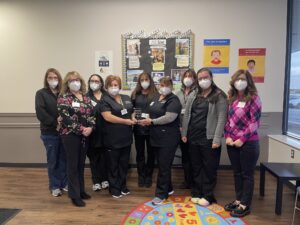 Family Health Council of Central Pennsylvania (FHCCP) and the organization’s Women, Infant, and Children (WIC) Tapestry of Health SUN Smiles program received the Rural Health Program of the Year award, presented by the Pennsylvania Office of Rural Health (PORH). The award was presented by Lisa Davis, director and outreach associate professor of health policy and administration at Penn State, on Nov. 17 at a ceremony at the WIC Tapestry of Health clinic in Shamokin Dam, PA.
Family Health Council of Central Pennsylvania (FHCCP) and the organization’s Women, Infant, and Children (WIC) Tapestry of Health SUN Smiles program received the Rural Health Program of the Year award, presented by the Pennsylvania Office of Rural Health (PORH). The award was presented by Lisa Davis, director and outreach associate professor of health policy and administration at Penn State, on Nov. 17 at a ceremony at the WIC Tapestry of Health clinic in Shamokin Dam, PA.
The Rural Health Program of the Year Award recognizes an exemplary health program that addresses an identified need in a rural community utilizing unique, creative, and innovative approaches to do so.
The award was presented during 2022 Rural Health Week in Pennsylvania, Nov. 14-18. The week encompasses Nov. 17, which is National Rural Health Day, established in 2011 by the National Organization of the State Offices of Rural Health. Both events celebrate “The Power of Rural” by honoring rural American residents, health care providers, and communities.
The nomination, submitted by Karen McCraw, vice president of advocacy and development at Family Health Council of Central Pennsylvania (FHCCP) in Camp Hill, PA, lauded SUN Smiles for developing a comprehensive program that formed partnerships between FHCCP, Central Susquehanna Opportunities, Snyder-Union Community Action Agency, and the Susquehanna River Valley Dental Health Clinic. The program was created to improve oral health outcomes for economically marginalized clients of the Special Supplemental Nutrition Program for WIC clients in Snyder, Union, and Northumberland counties.
The goals of SUN Smiles are to reduce the proportion of adults and children with untreated tooth decay; increase the proportion of children, adolescents, and adults who use the oral health care system; increase the proportion of people with dental insurance; and reduce the proportion of persons who are unable to obtain or delay obtaining necessary dental care. The program also aims to reduce the proportion of children ages one to five who report dental problems, reduce oral health disparities among low-income rural clients, and give every adult and child in WIC the chance to have a healthy smile. All pregnant and postpartum women and children who are clients of WIC are routinely screened for dental needs and referred to Community Health Workers (CHW), as needed, for assistance with Medicaid enrollment, appointment scheduling, transportation, payment for services, and more.
In the first 11 months of the program, SUN Smiles screened 2,028 WIC clients and referred 700 clients to CHWs and 400 clients to dental care; 154 program clients received dental services at FHCCP’s partner dental provider site. In addition to care navigation, oral health education and fluoride varnish days at WIC offices are key elements of the program.
PORH was formed in 1991 as a joint partnership between the federal government, the Commonwealth of Pennsylvania, and Penn State. The office is one of 50 state offices of rural health in the nation and is charged with being a source of coordination, technical assistance, networking, and partnership development.
PORH provides expertise in the areas of rural health, population health, quality improvement, oral health, and agricultural health and safety. PORH is administratively located in the Department of Health Policy and Administration in the College of Health and Human Development at Penn State University Park.
Each year, PORH presents awards to recognize rural health programs and individuals who have made substantial contributions to rural health in Pennsylvania. To learn more about the Pennsylvania Office of Rural Health, visit porh.psu.edu.
East Lycoming Ambulance Association Receives Rural Health Program of the Year Award
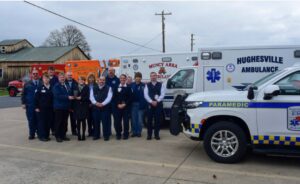 The East Lycoming Ambulance Association (ELAA), Hughesville, PA, received the Rural Health Program of the Year award, presented by the Pennsylvania Office of Rural Health (PORH). The award was presented by Lisa Davis, director of PORH and outreach associate professor of health policy and administration at Penn State, on Nov. 17 at the ELAA headquarters in Hughesville.
The East Lycoming Ambulance Association (ELAA), Hughesville, PA, received the Rural Health Program of the Year award, presented by the Pennsylvania Office of Rural Health (PORH). The award was presented by Lisa Davis, director of PORH and outreach associate professor of health policy and administration at Penn State, on Nov. 17 at the ELAA headquarters in Hughesville.
The Rural Health Program of the Year Award recognizes an exemplary health program that addresses an identified need in a rural community by utilizing unique, creative, and innovative approaches to do so.
The award was presented during 2022 Rural Health Week in Pennsylvania, Nov. 14-18. The week encompasses Nov. 17, which is National Rural Health Day, established in 2011 by the National Organization of the State Offices of Rural Health. Both events celebrate “The Power of Rural” by honoring rural American residents, health care providers, and communities.
The nomination, submitted by Joshua Dorman, ambulance captain at the Hughesville Volunteer Fire Department, Hughesville, PA, recognized the 20-year cooperative effort between four volunteer fire departments, Hughesville Volunteer Fire Company, Muncy Area Volunteer Fire Company, Picture Rocks Volunteer Fire Company, and Muncy Township Volunteer Fire Company. The association is completely self-funded by these fire companies which underwrite Emergency Medical Technicians (EMT) wages and provide the necessary equipment and facility to provide emergency services in rural Pennsylvania.
The fire companies staff a Basic Life Support ambulance seven days a week which is responsible for covering 911 emergency medical calls and vehicle accidents for 10 municipalities in rural Pennsylvania. Throughout the COVID-19 pandemic, this collaboration has been critical for the area due to the significant increase in emergency calls. Without these companies providing these essential services, many of those calls would go unanswered.
PORH was formed in 1991 as a joint partnership between the federal government, the Commonwealth of Pennsylvania, and Penn State. The office is one of 50 s
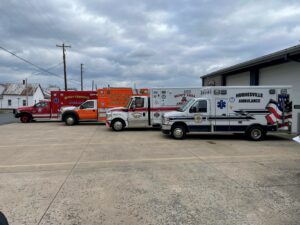
tate offices of rural health in the nation and is charged with being a source of coordination, technical assistance, networking, and partnership development.
PORH provides expertise in the areas of rural health, population health, quality improvement, oral health, and agricultural health and safety. PORH is administratively located in the Department of Health Policy and Administration in the College of Health and Human Development at Penn State University Park.
Each year, PORH presents awards to recognize rural health programs and individuals who have made substantial contributions to rural health in Pennsylvania. To learn more about the Pennsylvania Office of Rural Health, visit porh.psu.edu.
Pennsylvania Senator Elder Vogel, Jr. Receives Rural Health Legislator of the Year Award
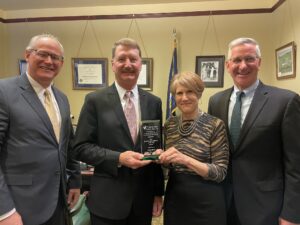
Pennsylvania Senator Elder Vogel, Jr. received the Rural Health Legislator of the Year Award, presented by the Pennsylvania Office of Rural Health (PORH). The award was presented by Lisa Davis, director of PORH and outreach associate professor of health policy and administration at Penn State, during a ceremony on Nov. 15, 2022, at the Main Capitol Building in Harrisburg, PA.
The Rural Health Legislator of the Year Award recognizes an outstanding legislator from Pennsylvania for their work and support of rural health initiatives that address an identified need in their district or across the state.
The award was presented during 2022 Rural Health Week in Pennsylvania, Nov. 14-18. The week encompasses Nov. 17, which is National Rural Health Day, established in 2011 by the National Organization of the State Offices of Rural Health. Both events celebrate “The Power of Rural” by honoring rural American residents, health care providers, and communities.
The nomination, submitted by Pennsylvania Secretary of Agriculture Russell Redding, recognized Vogel for recognizing and addressing the mental health needs of the agricultural community and bringing statewide and community attention to this important issue. As a fourth-generation farmer, Vogel is abundantly aware of the significance of this issue and the missed cries for help. He continues to discuss, share helpful resources, and advocate for the farming community. Vogel also is a compelling advocate of telemedicine for agricultural and rural communities. He sponsored legislation that has defined telemedicine and provided opportunities for rural areas to receive specialized care, including mental health services, without traveling outside the community.
PORH was formed in 1991 as a joint partnership between the federal government, the Commonwealth of Pennsylvania, and Penn State. The office is one of 50 state offices of rural health in the nation and is charged with being a source of coordination, technical assistance, networking, and partnership development.
PORH provides expertise in the areas of rural health, population health, quality improvement, oral health, and agricultural health and safety. PORH is administratively located in the Department of Health Policy and Administration in the College of Health and Human Development at Penn State University Park.
Each year, PORH presents awards to recognize rural health programs and individuals who have made substantial contributions to rural health in Pennsylvania. To learn more about the Pennsylvania Office of Rural Health, visit porh.psu.edu.
Amanda Vaglia, D.O. Recognized as 2022 Rural Health Community Star
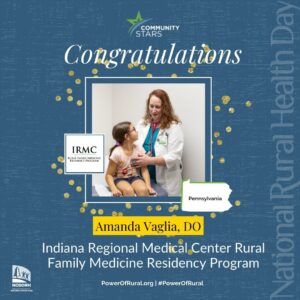
Amanda Vaglia, D.O, Primary Care Physician and Program Director at Indiana Regional Medical Center’s Rural Family Medicine Residency Program, Indiana Regional Medical Center, Indiana. PA, is Pennsylvania’s 2022 Community Star, designate by the National Organization of State Offices of Rural Health (NOSORH). NOSPRH, the member association for each of the 50 State Offices of Rural Health, leads National Rural Health Day. The Pennsylvania Office or Rural Health, University Park, PA, collaborates with NOSORH to recognize those who serve the vital needs of the estimated 57 million people living in rural America.
The nomination, submitted by Lisa Davis, MHA, Director and Outreach Associate Professor of Health Policy and Administration, Pennsylvania Office of Rural Health, University Park, PA, lauded Vaglia’s advocacy for developing the Rural Physician Residency Program at Indiana Regional Medical Center (IRMC), to ensure access to high quality health care and to training the next cohort of talented rural primary physicians. Davis notes, “Dr. Vaglia has deep roots in rural Pennsylvania and has spent her academic and professional career on providing high quality primary care to generations of families, from birth to geriatrics.”
Dr. Vaglia has been a true rural health community champion and star. She has recognized the need to recruit and retain physicians in her community, cultivate rural leadership and practice in medical residents, and address rural population health. Dr. Vaglia is focused on education, collaboration, and communication that led the efforts to fulfill the vision of establishing a family medicine residency program at IRMC, which serves as the rural sole community hospital in the county. The Rural Residency Program has at its core, the mission of providing excellent, comprehensive, family medicine training so that graduates might fill health care disparities in rural Pennsylvania communities.
Dr. Vaglia also serves on statewide Pennsylvania Rural Physician Pathway Planning Committee, a collaboration between the Area Health Education Center program, rural clinical training programs across the state, the Pennsylvania Primary Care Career Center, the Pennsylvania Academy of Family Physicians, and the Pennsylvania Office of Rural Health, to envision an innovative clinical pipeline for recruitment, training, and retention in rural communities.
The National Organization of State Offices of Rural Health’s (NOSORH) annual Community Star recognition program is one of the most popular features of National Rural Health Day. Each person, coalition, and organization nominated to be their state’s Community Star represents the faces and grassroots initiatives that are working to address the social determinants of health and improve the lives of those who call rural their home. The 2022 Community Stars book can be accessed at www.powerofrural.org.
Gov. Tom Wolf Proclaims November 14-18, 2022 Rural Health Week in Pennsylvania
In an effort to draw attention to the wide range of issues that impact rural health, Gov. Tom Wolf has declared Nov. 14-18, 2022, as Rural Health in Pennsylvania week at the request of the Pennsylvania Rural Health Association (PRHA) and the Pennsylvania Office of Rural Health (PORH).
Gov. Wolf made the proclamation to promote awareness of the full range of issues that impact rural health care throughout the Commonwealth and the health status of rural Pennsylvanians. Nationally, Pennsylvania ranks as one of the states with the highest number of rural residents, with 26 percent of Pennsylvanians residing in rural areas. In recognition of Pennsylvania’s diverse rural needs, the Commonwealth has supported the development of the Center for Rural Pennsylvania, the Pennsylvania Office of Rural Health, and other agencies and initiatives to address the needs of rural Pennsylvanians.
The week encompasses Nov. 17, which is National Rural Health Day, established in 2011 by the National Organization of State Offices of Rural Health (NOSORH) to showcase rural America; increase awareness of rural health issues; and promote the efforts of NOSORH, State Offices of Rural Health (SORHs) and others in addressing those issues.
“Nearly 59.5 million Americans, including 3.4 million Pennsylvanians, live in rural communities,” said Lisa Davis, PORH director and outreach associate professor of health policy and administration at Penn State. “These small towns and communities continue to be fueled by the creative energy of citizens who step forward to provide a wealth of products, resources, and services.
Rural communities also face unique health care concerns: a lack of providers; accessibility issues, particularly in terms of transportation and technology; and affordability issues as the result of larger percentages of uninsured and underinsured citizens and greater out-of-pocket health costs. Rural hospitals and health care providers, which frequently are the economic backbone of the communities they serve, deserve special consideration so that they can continue to provide high-quality services and meet the needs of rural residents.”
To celebrate the work being done to achieve health care access and equity in Pennsylvania, PORH will present Pennsylvania Rural Health Awards during in communities across Pennsylvania.
PORH was established in 1991 to enhance the health status of rural Pennsylvanians and strengthen the delivery and quality of care in the communities in which they live. Each year, the organization presents awards to recognize rural health programs and individuals who have made substantial contributions to rural health in Pennsylvania. To learn more about the Pennsylvania Office of Rural Health, visit porh.psu.edu.
PRHA is dedicated to enhancing the health and well-being of Pennsylvania’s rural citizens and communities. Through the combined efforts of individuals, organizations, professionals, and community leaders, the Association is a collective voice for rural health issues and a conduit for information and resources. More information can be found at paruralhealth.org.
Webinar Explores Strategies for Cultivating a Rural Health Workforce
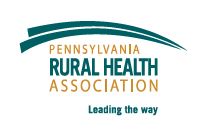 On September 6, 2022, the Pennsylvania Rural Health Association held a webinar on training, recruiting, and retaining a strong rural health workforce in Pennsylvania, as part of its Special Topics in Rural Health 2022 Webinar Series hosted by Rep. Kathy Rapp (R-PA 65th District) and Sen. Michele Brooks (R-PA 50th District). Ben Fredrick, MD, Professor of Family & Community Medicine at the Penn State College of Medicine and Program Director of the Pennsylvania Area Health Education Center (PA AHEC), gave a compelling presentation on strategies for cultivating rural health professionals in our hometowns.
On September 6, 2022, the Pennsylvania Rural Health Association held a webinar on training, recruiting, and retaining a strong rural health workforce in Pennsylvania, as part of its Special Topics in Rural Health 2022 Webinar Series hosted by Rep. Kathy Rapp (R-PA 65th District) and Sen. Michele Brooks (R-PA 50th District). Ben Fredrick, MD, Professor of Family & Community Medicine at the Penn State College of Medicine and Program Director of the Pennsylvania Area Health Education Center (PA AHEC), gave a compelling presentation on strategies for cultivating rural health professionals in our hometowns.
See below for the links to the presentation, recording, and handout.
Presentation: Cultivating A Rural Health Workforce in Pennsylvania
Recording: Cultivating a Rural Health Workforce in Pennsylvania
